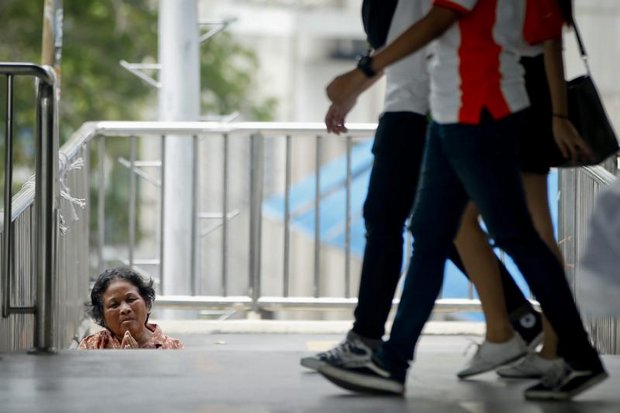
NAKHON RATCHASIMA - A new law on street begging control came into effect nationwide Thursday, as the government vowed to wipe out illegal beggars.
Under the law, those proven to be foreign beggars will be deported and beggars who are Thai nationals will be forced to undergo a rehabilitation programme that includes occupational training, Social Development and Human Security Minister Adul Sangsingkeo said.
Those making an illegal business out of getting people to beg for money on the street can be jailed for up to three years and/or fined up to 30,000 baht, said Pol Gen Adul.
As for those found guilty of exploiting the disabled or mentally ill in this business may, under the law, face a maximum jail sentence of five years and/or a maximum fine of 50,000 baht, he said.
Since beginning a so-called beggar regulating policy in October, 2014, the ministry has counted about 4,648 beggars, or 2,944 Thais and 1,704 foreigners, he said.
Regulating street beggars is part of the government's efforts to tackle human trafficking and impose social order, said government spokesman Sansern Kaewkamnerd.
Between September, 2014 and January this year, a total of 3,896 beggars, children and adults have been rescued, Maj Gen Sansern said.
Of this number, 2,487 were Thai nationals and 1,409 were foreigners, he said.
The government was worried about exploitation of babies and children and had learnt people running child beggars for a living could make two to 10 times better money than adult beggars can earn, he said.
They also found over 90% of newborn babies and children aged 10 or younger used for street begging were victims of human trafficking involving criminals from neighbouring countries, he said.
In past suppression efforts, authorities have adopted a DNA testing and comparison technique to prove if these children really belong to the people claiming to be their parents, he said.
Those proven to not be the biological parents of the children were arrested while the human trafficking victims have been sent to a government centre for the homeless, he said.
Members of the public are encouraged to help report any suspected cases of human trafficking-style street begging to the government at its hotline No. 1300, he said.